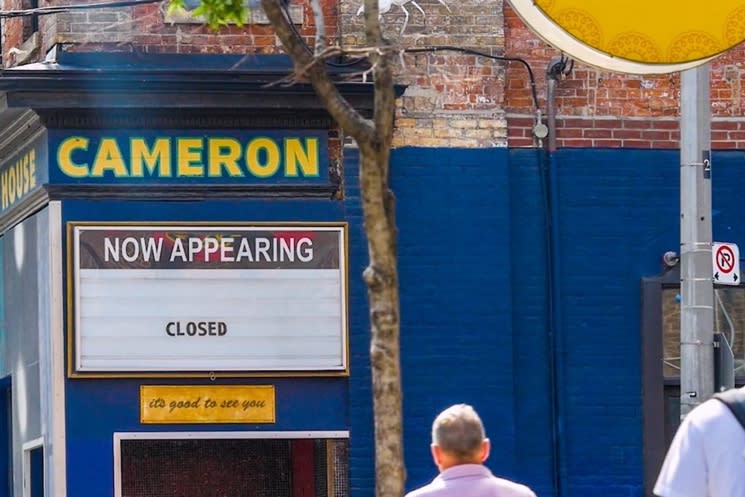It's jarring to see the Horseshoe Tavern completely empty. Well, almost: majority-owner Jeff Cohen pulls up a stool onstage for his interview, as one of the Danny Alexander-directed film's many contributing local organizers, musicians and politicians.
No Tickets at the Door is founded on fundamental community values that remain steadfast in a time otherwise rife with uncertainty. The film takes us behind boarded-up venue entrances to capture the Toronto music scene's renegotiation of identity in the COVID-19 era.
The documentary shows a full spectrum of reactions to the pandemic, from the desolation of cancelled tours to the relief of slowing down and discovering new passions in the shift away from performing. Contributors recount the ongoing re-evaluation and its consequent innovations, as well as share optimistic visions of live music's return.
As if you needed reminding, the film's nostalgia is brought to life by Bob Sato's illustrious collection of archival concert footage. An original Twin Rains score ties together samplings from the diverse list of contributing musicians.
The cautionary tale of London, UK's loss of 40 percent of its live music venues from 2007 to 2014 looms large — something that resonates with Toronto audiences, given the city's vicious gentrification. The scope of venue closures even extends to the borders of the GTA, with cities like Guelph and Waterloo seeing a similar disappearance of live music spaces.
Though venues were closing long before the coronavirus, the pandemic has shown the immense value of Toronto's vibrant music culture — not to mention its economic force — in the absence of live shows. "For too long, we as a city and we as a country have taken live music for granted," says city councillor Joe Cressy.
"Our response to COVID from a music perspective can't simply be about saving what we used to have," says Cressy. "It should be about building a better music ecosystem and supporting it better going forward." No Tickets at the Door offers a promising vision of the future of live music — one that perhaps could have included some consideration of accessibility in the benefits of livestreaming, as well as the barriers that have regularly excluded some fans from live music spaces pre-pandemic.
No Tickets at the Door can offer no easy resolution to the complex issue of Toronto's cultural retention amidst gentrification and a global pandemic. As of the film's release, the lines we're waiting in are for vaccines — but this is a crucial step, and the film serves as a reminder of how far we've come since the last live shows of early March 2020. When live music finally returns, what further policy adaptations can we embrace to help sustain it?
No Tickets at the Door is streaming via Hot Docs until July 6. It is co-presented by Exclaim! and Wavelength.
(Independent)No Tickets at the Door is founded on fundamental community values that remain steadfast in a time otherwise rife with uncertainty. The film takes us behind boarded-up venue entrances to capture the Toronto music scene's renegotiation of identity in the COVID-19 era.
The documentary shows a full spectrum of reactions to the pandemic, from the desolation of cancelled tours to the relief of slowing down and discovering new passions in the shift away from performing. Contributors recount the ongoing re-evaluation and its consequent innovations, as well as share optimistic visions of live music's return.
As if you needed reminding, the film's nostalgia is brought to life by Bob Sato's illustrious collection of archival concert footage. An original Twin Rains score ties together samplings from the diverse list of contributing musicians.
The cautionary tale of London, UK's loss of 40 percent of its live music venues from 2007 to 2014 looms large — something that resonates with Toronto audiences, given the city's vicious gentrification. The scope of venue closures even extends to the borders of the GTA, with cities like Guelph and Waterloo seeing a similar disappearance of live music spaces.
Though venues were closing long before the coronavirus, the pandemic has shown the immense value of Toronto's vibrant music culture — not to mention its economic force — in the absence of live shows. "For too long, we as a city and we as a country have taken live music for granted," says city councillor Joe Cressy.
"Our response to COVID from a music perspective can't simply be about saving what we used to have," says Cressy. "It should be about building a better music ecosystem and supporting it better going forward." No Tickets at the Door offers a promising vision of the future of live music — one that perhaps could have included some consideration of accessibility in the benefits of livestreaming, as well as the barriers that have regularly excluded some fans from live music spaces pre-pandemic.
No Tickets at the Door can offer no easy resolution to the complex issue of Toronto's cultural retention amidst gentrification and a global pandemic. As of the film's release, the lines we're waiting in are for vaccines — but this is a crucial step, and the film serves as a reminder of how far we've come since the last live shows of early March 2020. When live music finally returns, what further policy adaptations can we embrace to help sustain it?
No Tickets at the Door is streaming via Hot Docs until July 6. It is co-presented by Exclaim! and Wavelength.
